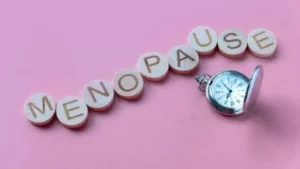Early menopause Linked to Higher Cancer Risk
According to one research, if menopause occurs early in a woman’s life, she may get breast and ovarian cancer. Let us explain the relationship between early menopause and cancer.
Every woman goes through menopause. Early menopause occurs when menstrual cycles end before the age of 45. The major symptom is irregular or no periods at all. Other symptoms of early menopause include night sweats, vaginal dryness, difficulty sleeping, and diminished sex drive. The symptoms are identical to those experienced by women over 45 during menopause. So you could believe it’s no big deal if menopause arrives early. Should not be taken lightly, as it increases the chance of developing breast and ovarian cancer. Read on to learn about the relationship between cancer.
Early menopause can raise the chance of acquiring two forms of cancer. Image credit of Freepik
New research on early menopause and cancer.
Some women who experience have a higher chance of getting breast and ovarian cancer, according to a study presented earlier this month at an annual conference of the Endocrine Society in Boston, United States.
Researchers at the University of Utah Health in Salt Lake City began their investigation with the notion that some women with primary ovarian insufficiency and their family members may be prone to particular forms of cancer. Primary ovarian insufficiency occurs when a woman’s ovaries cease performing normally before the age of forty. During the trial, the researchers discovered that women who had early menopause were twice as likely to get breast cancer and nearly four times as likely to develop ovarian cancer.
Another study discovered that women who undergo menopause before the age of 40 have a higher risk of dying early. According to study published in May 2024 in Endocrine Abstracts, women who had are twice as likely to die from cardiac disease. They also discovered that those women are four times more likely to die of cancer.
Early menopause is associated with breast and ovarian cancer. Image courtesy: Adobe Stock
What is menopause?
It is a natural biological process that women experience throughout their lives. It signifies the end of the menstrual cycle and reproductive years. It generally affects women over the age of 45. Dr Chetna Jain, an obstetrician and gynaecologist, notes that during this period, a woman’s ovaries drastically limit their production of estrogen and progesterone, the two essential hormones that govern the menstrual cycle and reproductive system.
[web_stories title=”false” excerpt=”false” author=”false” date=”false” archive_link=”true” archive_link_label=”” circle_size=”150″ sharp_corners=”false” image_alignment=”left” number_of_columns=”1″ number_of_stories=”5″ order=”DESC” orderby=”post_title” view=”circles” /]
What is early menopause?
It is the commencement of menopause before the age of 45, with the same symptoms and hormonal changes as conventional menopause. It just occurs early in a woman’s life.What is the reason of early menopause?
Early menopause can be avoided to some degree. Image credit: Adobe Stock.
Here are some of the causes.
- A family history of early menopause.
- Chemotherapy, radiation treatment, and ovarian surgery are examples of procedures.
- Thyroid illness and rheumatoid arthritis are two conditions that might cause early ovarian failure.
Smoking - Poor diet.
- Certain illnesses, such as mumps, might harm the ovaries and result
How is early menopause associated with breast and ovarian cancer?
- Early menopause has been related to breast and ovarian cancer, mostly through its interaction with medicinal therapies and
- hereditary factors. Women who get cancer treatments such as chemotherapy or radiation therapy may suffer early
- menopause due to the damage these therapies can do to the ovaries, according to the specialist.
Furthermore, the surgical removal of the ovaries (oophorectomy) as a prophylactic step for individuals at high risk of ovarian or breast cancer (such as those with BRCA1 or BRCA2 mutations) causes rapid menopause. Dr. Jain believes that genetic abnormalities like BRCA1 and BRCA2 dramatically raise the risk of breast and ovarian cancer. As a result, women with these mutations frequently have preventive oophorectomy to lower their cancer risk.
How can I avoid going into menopause too early?
Also Read: Premature and Early Menopause
1. Healthy living choices.
Avoid smoking, since it has been related to early menopause. Quitting smoking can help protect ovarian function, according to the specialist. Consuming a balanced diet that includes fruits, vegetables, lean meats, and whole grains might improve general health and perhaps postpone menopause. Maintain a healthy weight and engage in physical activity to help balance hormones and promote reproductive health.
2. Medical Interventions
For women enduring chemotherapy or radiation therapies that might cause early menopause, egg freezing or ovarian shielding may help retain fertility and postpone menopause. In rare circumstances, doctors may prescribe hormone therapy to assist control menstrual cycles and keep hormone levels stable.
You can take a few actions to avoid early menopause:
3. Manage health problems.
Effectively controlling autoimmune illnesses with the assistance of a doctor can lower the chance of early ovarian failure. The specialist recommends periodic check-ups to help diagnose and treat health concerns that may lead to early menopause
4. Stress Management
Chronic stress might affect your hormone levels. To assist reduce stress, try activities like yoga, meditation, and mindfulness, or just listen to peaceful music.
It is impossible to completely prevent early menopause, but these methods can help minimize the risk of cancer and improve general reproductive health.
Also Read; Pregnancy acne: Why does it happen 1?
Health Conscious Plus
Welcome to Health Conscious Plus Find health insights, disease management tips, meal plans, and mindful living strategies for a healthier life.



